[Capítulo V: Nuestra democracia y sus conflictos] Democratic Governance: The Key to Political and Economic Reform
[http://www.cipe.org/publications/education/ip/IP0405.pdf]
Democratic Governance: The Key to Political and Economic Reform
Lack of democratic governance seriously threatens democracy-building and market-based reforms worldwide. In some countries, the absence of democratic governance has engendered populism, socialism, and even terrorism. Establishing the necessary governance institutions is essential to the future of democracy and free markets and to the stability of the international system.
The political, economic, and social consequences for countries lacking democratic governance include: widespread corruption; poor infrastructure; high business costs; low investment, growth, employment, and income levels; national, regional, and international instability; and growing citizen disappointment.
This paper presents a series of policy recommendations and strategies that provide members of the private sector and civil society, government officials, and foreign aid donors with essential tools to establish democratic governance. The report also highlights several case studies that reveal the experiences of CIPE and its partners in building better democracies. The report concludes by emphasizing that democratic governance is the linchpin for successful political and economic reform and that countries that have instituted democratic governance have achieved superior development outcomes.
Common Definitions of Governance
World Bank: The World Bank defines governance as the traditions and institutions by which authority in a country is exercised for the common good. Th is
includes (i) the process by which those in authority are selected, monitored and replaced, (ii) the capacity of the government to eff ectively manage its resources
and implement sound policies, and (iii) the respect of citizens and the state for the institutions that govern economic and social interactions among them.
United Nations Development Programme: Governance can be seen as the exercise of economic, political and administrative authority to manage a country’s aff airs
at all levels. It comprises the mechanisms, processes and institutions through which citizens and groups articulate their interests, exercise their legal rights, meet their obligations and mediate their differences.
Definition of Democratic Governance
CIPE: Democratic governance comprises the traditions, institutions, and processes that determine how government decisions are made on a daily basis, and
addresses the following questions:
• How and to what extent are citizens given a voice in day-to-day policymaking?
• How efficiently are public resources and services managed?
• How are abuses of governmental power prevented?
• How are government offi cials held accountable for their actions?
• How are grievances redressed?
Sound democratic governance mechanisms help to create functioning democracies.
Bajar paper completo: IP0405.pdf (Objeto application/pdf)
--
Posted by Alberdi & Urquiza to Capítulo V: Nuestra democracia y sus conflictos at 1/27/2006 06:31:00 PM
Democratic Governance: The Key to Political and Economic Reform
Lack of democratic governance seriously threatens democracy-building and market-based reforms worldwide. In some countries, the absence of democratic governance has engendered populism, socialism, and even terrorism. Establishing the necessary governance institutions is essential to the future of democracy and free markets and to the stability of the international system.
The political, economic, and social consequences for countries lacking democratic governance include: widespread corruption; poor infrastructure; high business costs; low investment, growth, employment, and income levels; national, regional, and international instability; and growing citizen disappointment.
This paper presents a series of policy recommendations and strategies that provide members of the private sector and civil society, government officials, and foreign aid donors with essential tools to establish democratic governance. The report also highlights several case studies that reveal the experiences of CIPE and its partners in building better democracies. The report concludes by emphasizing that democratic governance is the linchpin for successful political and economic reform and that countries that have instituted democratic governance have achieved superior development outcomes.
Particularmente interesante encontré el Box1 en página 2 del mismo paper donde habla sobre las definiciones de Governance, y las similitudes con mi paper
Common Definitions of Governance
World Bank: The World Bank defines governance as the traditions and institutions by which authority in a country is exercised for the common good. Th is
includes (i) the process by which those in authority are selected, monitored and replaced, (ii) the capacity of the government to eff ectively manage its resources
and implement sound policies, and (iii) the respect of citizens and the state for the institutions that govern economic and social interactions among them.
United Nations Development Programme: Governance can be seen as the exercise of economic, political and administrative authority to manage a country’s aff airs
at all levels. It comprises the mechanisms, processes and institutions through which citizens and groups articulate their interests, exercise their legal rights, meet their obligations and mediate their differences.
Definition of Democratic Governance
CIPE: Democratic governance comprises the traditions, institutions, and processes that determine how government decisions are made on a daily basis, and
addresses the following questions:
• How and to what extent are citizens given a voice in day-to-day policymaking?
• How efficiently are public resources and services managed?
• How are abuses of governmental power prevented?
• How are government offi cials held accountable for their actions?
• How are grievances redressed?
Sound democratic governance mechanisms help to create functioning democracies.
Bajar paper completo: IP0405.pdf (Objeto application/pdf)
--
Posted by Alberdi & Urquiza to Capítulo V: Nuestra democracia y sus conflictos at 1/27/2006 06:31:00 PM













<< Home